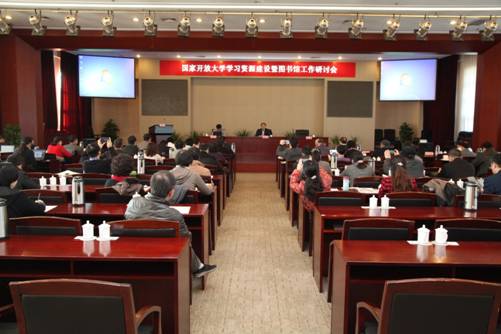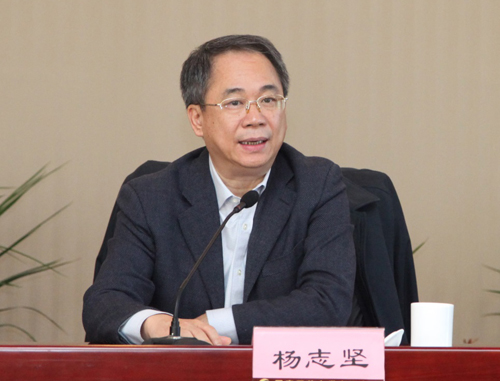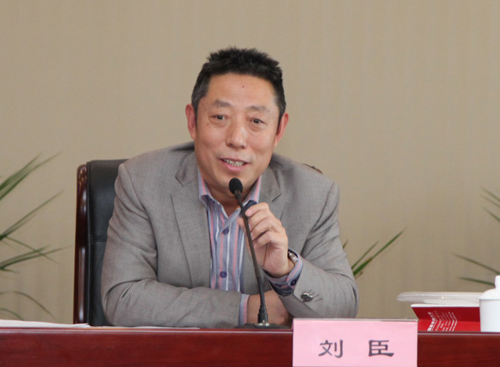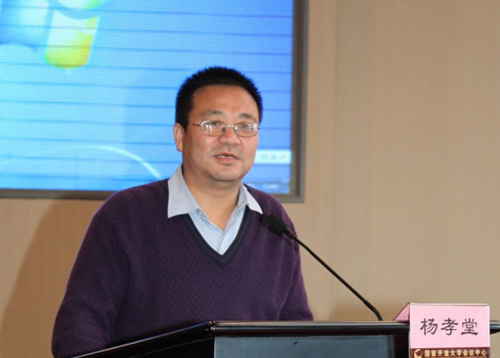 On December 3-4, 2015, the OUC's Learning Resources Development & Library Working Seminar was held in Beijing. The seminar focused on how to promote both learning resources development and their application, centred around each course and guided by the demands of the learners.
On December 3-4, 2015, the OUC's Learning Resources Development & Library Working Seminar was held in Beijing. The seminar focused on how to promote both learning resources development and their application, centred around each course and guided by the demands of the learners.
 Participants discussed how to promote the construction of a digital library in the educational system, form a co-construction and sharing mechanism, serve academic and non-academic education, and boost the development of a learning society. More than 80 people from OUC teaching departments and related management departments, as well as heads and directors from OUC branches attended the seminar. At the seminar, 29 units were awarded certificates for their courses’ excellence in 2015.
Participants discussed how to promote the construction of a digital library in the educational system, form a co-construction and sharing mechanism, serve academic and non-academic education, and boost the development of a learning society. More than 80 people from OUC teaching departments and related management departments, as well as heads and directors from OUC branches attended the seminar. At the seminar, 29 units were awarded certificates for their courses’ excellence in 2015.
 President of the OUC Yang Zhijian introduced the progress of development in the past three years. He also talked about how to understand the OUC, stressing that the OUC is directly affiliated with the Ministry of Education. He noted its purpose is to promote national lifelong learning. The OUC is a new style of university supported by modern information technology that focuses equally on degree and non-degree education. The OUC is a public platform that integrates the school’s operation into its system. It adheres to a policy of "unified strategy, public platform, resource sharing, dislocation development, and giving full play to respective and distinctive features." In running the school, we need to respect requests made by different interest groups, adhere to the tradition of "running a school system and intensive education," and deal with various challenges. By adhering to the principle of "mutual negotiation, construction, and management; sharing; and win-win results," each unit "is well positioned, fulfills their responsibilities, gives full play to their respective strengths and distinctive features, and gets everything in place."
President of the OUC Yang Zhijian introduced the progress of development in the past three years. He also talked about how to understand the OUC, stressing that the OUC is directly affiliated with the Ministry of Education. He noted its purpose is to promote national lifelong learning. The OUC is a new style of university supported by modern information technology that focuses equally on degree and non-degree education. The OUC is a public platform that integrates the school’s operation into its system. It adheres to a policy of "unified strategy, public platform, resource sharing, dislocation development, and giving full play to respective and distinctive features." In running the school, we need to respect requests made by different interest groups, adhere to the tradition of "running a school system and intensive education," and deal with various challenges. By adhering to the principle of "mutual negotiation, construction, and management; sharing; and win-win results," each unit "is well positioned, fulfills their responsibilities, gives full play to their respective strengths and distinctive features, and gets everything in place."
Yang Zhijian pointed out that, in recent years, the OUC has made many achievements in resource development, especially enriching the types and amount of digital learning resources. Currently, the OUC has developed text teaching materials for 1,500 courses, 685 online courses, 510,000 minutes of audio and video resources, 17,000 five-minute courses, and over 30 courses provide digital textbooks based on a ubiquitous learning design. The OUC has also developed a web-based course development plan for 2013-2015. Through a special campaign of "selective courses and feature courses for western regions, rural areas, farmers, and agriculture," the OUC aims to promote a mutual development and sharing mechanism for operating the school system’s courses and improving the overall capacity and quality of course development in the system. In terms of resource agglomeration, the digital learning resource centre set up 224 sub-centres across the country containing degree and non-degree education courses to achieve the sharing of learning resources. In terms of resource publicity, high quality resources are available for rural and western regions at the following websites: http://www.iygw.cn/, http://www.legalinfo.gov.cn/, and http://dxspace.nerc-edu.com/Member.aspx.
Yang Zhijian pointed out that the construction and promotion of a digital library is also a highlight. The library, with the digital library at its core, perfectly suits the nature of the OUC. Since the digital library service opened to the school system’s teachers and students in 2012, the construction and application of the digital library has accomplished much: all kinds of literature databases developed through co-construction and sharing, maximizing the interests of the school system, as well as research and development of a digital library platform and mobile library APP, benefitting 3.6 million students by enabling them to query literature-related information whenever they have internet access. This has provided the support necessary for scientific research, education, and teaching.
Regarding future work, Yang Zhijian pointed out that the OUC will explore co-construction and sharing mechanisms. He also believes the development of learning resources and a digital library should be based on particular disciplines and focused on curriculum, guided by learners’ demands. The OUC should study and formulate a "13th Five-Year" learning resources construction plan, put forward the core task for the construction of degree and non-degree education, and focus on tasks central to implementing the plan. The library should proceed from the working thoughts of "collection, construction, push" to carry out the construction and service work of literary resources.
 Vice President of the OUC Liu Chen reported on preparations for establishing the OUC's Learning Resources Construction Committee. He pointed out the advantageous tradition of the OUC in fully utilizing high-quality educational resources in society and adhering to the principles of "well-known teachers and team building" in carrying out course development. The establishment of a course sharing alliance between universities and MOOCs, given the current challenges and opportunities, is of great significance in advancing the co-construction of course resources and a sharing mechanism for the entire educational system. Liu Chen advised that, in order to develop and apply its resources, the OUC should further strengthen the arrangement, planning, guidance, and coordination of resource development agencies; attach great importance to basic resource development and the application of all kinds of resources; accelerate the adjustment of subjects and promote the construction of a “learner development overpass”; coordinate and form a new resource construction and application mechanism; further explore the co-construction and sharing of resources, and implement a mechanism that benefits investors and builders; mobilize the enthusiasm and creativity of the system’s teachers and students; make use of the advantages and resources of four support alliances to strengthen the agglomeration and publicizing of quality learning resources.
Vice President of the OUC Liu Chen reported on preparations for establishing the OUC's Learning Resources Construction Committee. He pointed out the advantageous tradition of the OUC in fully utilizing high-quality educational resources in society and adhering to the principles of "well-known teachers and team building" in carrying out course development. The establishment of a course sharing alliance between universities and MOOCs, given the current challenges and opportunities, is of great significance in advancing the co-construction of course resources and a sharing mechanism for the entire educational system. Liu Chen advised that, in order to develop and apply its resources, the OUC should further strengthen the arrangement, planning, guidance, and coordination of resource development agencies; attach great importance to basic resource development and the application of all kinds of resources; accelerate the adjustment of subjects and promote the construction of a “learner development overpass”; coordinate and form a new resource construction and application mechanism; further explore the co-construction and sharing of resources, and implement a mechanism that benefits investors and builders; mobilize the enthusiasm and creativity of the system’s teachers and students; make use of the advantages and resources of four support alliances to strengthen the agglomeration and publicizing of quality learning resources.
Deputy Director of Department of Teaching Resources Management (Library) Du Ruo introduced the important role of learning resources construction in the development of the OUC, as well as the progress of course resources development and application during the period of the "12th five-year plan." Deputy Director of Learning Resources Department (Library) Zhao Xuan introduced the drafting process for the OUC's "13th Five-Year" Key Planning Points for Learning Resources Development. The meeting also discussed the main report, learning resources development committee charter, "13th five-year" planning key points, learning resources development, application, and library working committee. Representatives from OUC headquarters and branches exchanged views on resource development and sharing, as well as library work. They shared views by delivering reports, including Characteristic Course Construction Experience in Western China, made by Luo Yi; Learning Resources Construction and Library Work Experience by Li Zhengguang, from Fujian RTVU; Architectures and Innovations of Digital Libraries of Open Universities by Fan Jianxin, from Jiangsu Open University; Working Experience of Library Service System Construction: with the Library Working Committee as Platform, made by Liang Ruiming from Guangdong RTVU; Working Experience in the Application and Promotion of Digital Library, made by Xue Qin from Gansu RTVU; and Experience of Learning Resources Development for Mobile Courses, delivered by Hu Jicheng from the OUC.
 The Secretary-General of the National Radio and Television University Resources Collaboration Association, and the General Manager of the OUC Publishing and Media Group, Yang Xiaotang, concluded the meeting. He observed that the school should properly handle the relationship between resource and course construction by focusing on courses’ resource development and handling the relationship between compulsory and selective courses. The OUC’s branches should set up more courses and disciplines suitable for localized situations; have an innovative concept of course development, sharing subjects, and courses; strengthen the integration of teaching materials and the resource library; adhere to the popularization and application of the digital library; and build a solid digital library for the school’s operating system.
The Secretary-General of the National Radio and Television University Resources Collaboration Association, and the General Manager of the OUC Publishing and Media Group, Yang Xiaotang, concluded the meeting. He observed that the school should properly handle the relationship between resource and course construction by focusing on courses’ resource development and handling the relationship between compulsory and selective courses. The OUC’s branches should set up more courses and disciplines suitable for localized situations; have an innovative concept of course development, sharing subjects, and courses; strengthen the integration of teaching materials and the resource library; adhere to the popularization and application of the digital library; and build a solid digital library for the school’s operating system.
By Yu Minsheng, OUC